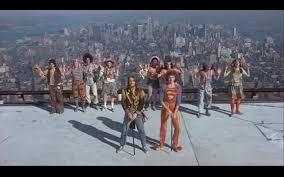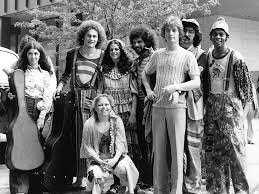Godspell: Hopelessly Dated, or Ahead of Its Time?
Has there ever been a musical that has dated itself more quickly than Godspell?
When growing up, this musical was everywhere. If off-Broadway wasn’t covering it, your junior high school was. If they weren’t covering it, your church’s arts program was.
Other than a short-lived revival in 2011, Godspell has faded into obsolescence. Perhaps there will still be some hold-outs, and I hope it continues, but for a musical that seems intent to change with the times, it has instead become somewhat cringe-worthy.
Ahead of Its Time?
And yet, while this musical seems forever entrenched in the era from which it sprung, it has also emerged as a harbinger of where society is at today. In fact, for all of the changes in society in the last forty years, one could look upon Godspell as a reason for such. There are three major areas: in terms of worship music, improvisational comedy, and informal spirituality.
Worship Music
The music in Godspell was a precursor of what will ultimately be known as the first phase of contemporary worship music. The popular songs “Prepare Ye” and most especially “Day by Day” were simple choruses, repeated over and again, with varying approaches to instrumentation. Using these two songs as a template, Maranatha!, Integrity/Hosanna and Vineyard Music emerged with their roster of simple songs, such as “As The Deer,” “Majesty,” and “Change My Heart O God.” These songs are still sung today.
But Godspell emerged as a forebearer of a different type of worship song–the modernized hymn. Some of the most noteworthy numbers in this musical had lyrics that were taken, verbatim, from public domain hymns. “Turn Back O Man”, “O Bless the Lord My Soul,” and “We Plow the Fields (All Good Gifts)” are still found in many hymnals. This has served as a blueprint for the contemporary renderings of Aaron Shust, Matt Maher, and most especially Chris Tomlin, who have continually jumped back into time to rediscover powerful public domain lyrics that they could use for their own compositions.
Improvisational Comedy
The Toronto production of Godspell stands apart as one of the greatest comedic casts I’ve ever seen: future SCTV regulars Martin Short, Andrea Martin and Eugene Levy (who eventually played Jesus) were on hand, as well as future SNL alumni Paul Shaffer (who later was David Letterman’s sidekick), and most especially Gilda Radner. In fact, Martin Short recalled in his memoir the auditions for this production, and was astounded at how “horrible” Radner’s audition went–whereas everybody else trained in musical theater was approaching this material with professionalism and poise, Radner played it funny, a little off key, and innocently. To Short’s surprise, she knocked the producers out. He immediately knew what to go for in his audition, and he got in as well.
To imagine that this was the training ground for some of our future comics is interesting. Can we imagine comedy today without the influence of Saturday Night Live or SCTV? They found a means to be unpredictable, contemporary, and edgy.
Informal Spirituality
In 1972, the Jesus Movement was in full spring. One of the major themes of this movement was to re-introduce a Jesus to the masses, one that had previously been inferred as unapproachable and formal. The changes to the liturgy, fresh from Vatican II, were being implemented, and acoustic guitars were starting to replace organs. It would be another few years where some Protestant pastors would trade in their clerical garb for Hawaiian shirts, and all Christian symbols were removed in place of scenic photographs with Bible verses superimposed.
As I am witnessing the resurgence of a formal spirituality, a rediscovery of liturgy, an and interest in Latin, I am divided about these “enhancements.” On the one hand, I wholeheartedly applaud any effort to use the language of the culture to introduce them to Jesus. But on the other hand, many are left with a diluted Christianity, one which does not “judge” them (so they don’t have to go to church), one which ignores Jesus’ hard teachings, and relegates them to the “Jesus was a product of His time” bucket.
And yet, as an introductory way to share Jesus with a then-new generation, I can’t help but feel grateful for the influence of Godspell in our culture.
All For The Best
Take the song, “All For the Best.” It’s an old vaudevillian style which simply relegates a Spiritual truth: “All things work together for good of those who love Him and are called according to His purpose.” (Rom 8:28). In its simple manner, it reads off a litany of bad-breaks and circumstances, only to conclude that in heaven, it will all work out.
Considering the events of 9/11, this sentiment runs quite facile. Too often a Christian may look upon such words as a cliche, as a simpleton’s approach to complex realities. It certainly runs as the worst thing one can say to a person who is grieving real tears.
But as you look at the video below, from the motion picture “Godspell“, instead, look at it as a re-embracing of a far more innocent time, a childlike approach to understanding the Kingdom of Heaven (which, happens to be the approach that Jesus speaks highly of).
And on this somber day of remembrance, be sure to stick around to the end of the video.
IMPORTANT NOTICE: Right now I am in the process of crafting an online course for helping pursue the New Evangelization. If you have a few minutes, could you complete a survey? In a few weeks, your name could be among five winners who would get my complete music collection for free. Thank you sooo much!










